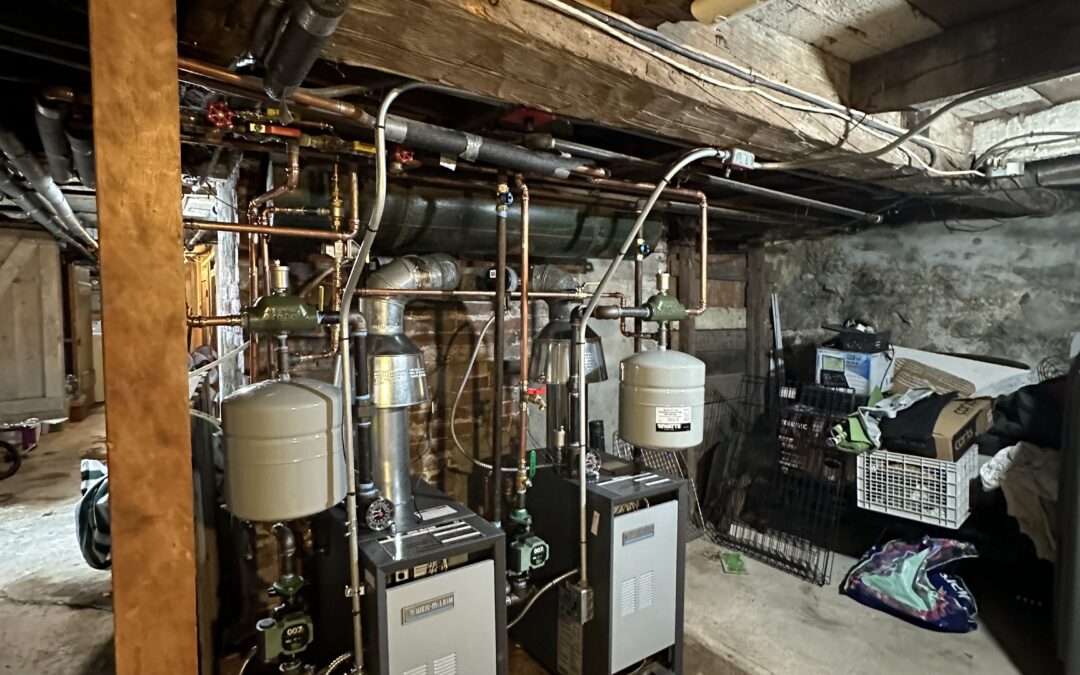Boilers are often out of sight, out of mind—until something goes wrong. Regular maintenance can prevent unexpected breakdowns, improve efficiency, and extend the lifespan of your system. As the leaves start to change color and the temperatures begin to drop, it’s time to think about your home’s heating system. By taking care of your boiler before the cold weather hits, you can avoid costly repairs and ensure consistent heat throughout the winter months.
Key Steps for Boiler Maintenance
- Schedule a Professional Inspection
The most important step in boiler maintenance is to have a professional HVAC technician inspect your system. They can identify and address potential issues that a layperson might overlook. Aim to schedule this inspection in late summer or early fall. - Check for Leaks
Inspect the area around your boiler for any signs of water leakage. Leaks can indicate a serious problem that needs immediate attention. Look for water stains or puddles, and listen for any unusual noises when the boiler is running. - Test the Thermostat
Ensure your thermostat is working correctly by testing it in both heating and cooling modes. If the thermostat isn’t responding properly, it may need to be recalibrated or replaced. An accurate thermostat ensures your boiler runs efficiently, maintaining the desired temperature without wasting energy. - Clean the Boiler and Components
Over time, dust and debris can accumulate inside your boiler, affecting its efficiency. Clean the boiler’s exterior and accessible components, such as the burner and heat exchanger. Make sure the vents and air intake are clear of obstructions to promote proper airflow. - Check Pressure Levels
Boilers rely on a specific pressure range to operate efficiently. Check the pressure gauge on your boiler and ensure it’s within the recommended range. If it’s too low or too high, you may need to adjust the pressure or call a professional for assistance. - Bleed Radiators
If your home has radiators, bleeding them can help remove trapped air that prevents them from heating properly. Use a radiator key to release the air until water begins to flow, indicating that the radiator is fully bled. - Inspect and Replace Filters
Filters play a crucial role in maintaining clean air and efficient boiler operation. Check the filters in your heating system and replace them if they’re dirty or clogged. Regularly changing filters helps maintain optimal airflow and reduces strain on the boiler. - Lubricate Moving Parts
Some components of your boiler, such as the pump and fan, require regular lubrication to function smoothly. Refer to your boiler’s manual for guidance on which parts need lubrication and how often to apply it. - Check Safety Devices
Modern boilers are equipped with various safety devices to prevent accidents. Test safety valves, pressure relief valves, and carbon monoxide detectors to ensure they’re functioning correctly. Safety should always be a top priority in boiler maintenance.
Common Boiler Issues and Troubleshooting
Even with preventive maintenance, issues can arise. Here are some common boiler problems and how to troubleshoot them:
- No Heat or Hot Water: Check the thermostat, pressure, and pilot light. If these are all functioning correctly, there may be an issue with the gas supply or a faulty component.
- Unusual Noises: Banging or whistling sounds can indicate air in the system, low pressure, or limescale buildup. Bleeding the radiators and checking pressure can help.
- Pilot Light Issues: If the pilot light keeps going out, it could be due to a faulty thermocouple or gas valve. This typically requires professional repair.
Final Thoughts
Taking the time to perform preventive boiler maintenance before fall can save you from the inconvenience of unexpected breakdowns and ensure your home stays warm and cozy. By following these steps, you can extend the life of your boiler and maintain its efficiency. For professional boiler maintenance services, reach out to ASK Plumbing and Heating. We’re proud to serve Salem, Essex, Lynn, Haverhill, Rowley, Georgetown, Denver and nearby areas.
FAQs on Boiler Maintenance
- How often should I service my boiler? It’s recommended to service your boiler annually, ideally before the heating season begins.
- Can I perform boiler maintenance myself? While homeowners can handle some basic tasks like bleeding radiators and checking pressure, a professional should conduct thorough inspections and repairs.
- What are the benefits of regular boiler maintenance? Regular maintenance improves efficiency, prevents breakdowns, extends the boiler’s lifespan, and ensures safe operation.
- What should I do if my boiler stops working? Check for simple issues like tripped breakers or low pressure. If you can’t identify the problem, call a professional technician.
- Is boiler maintenance expensive? Preventive maintenance is generally affordable and can save you money in the long run by avoiding costly repairs and improving energy efficiency.
